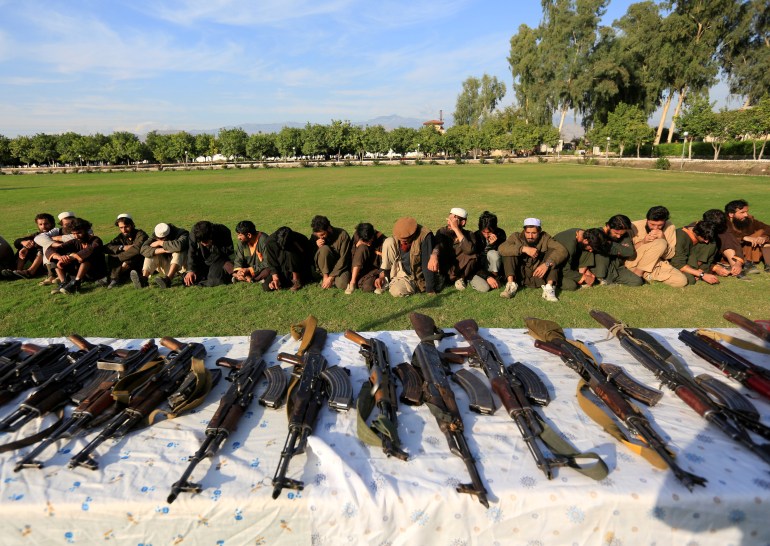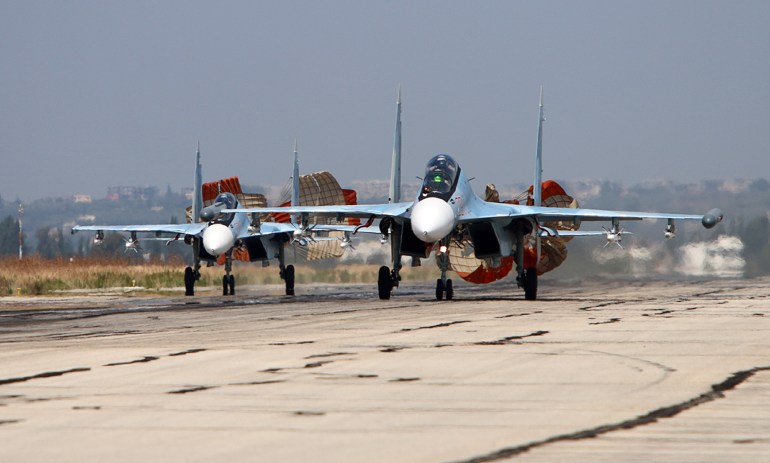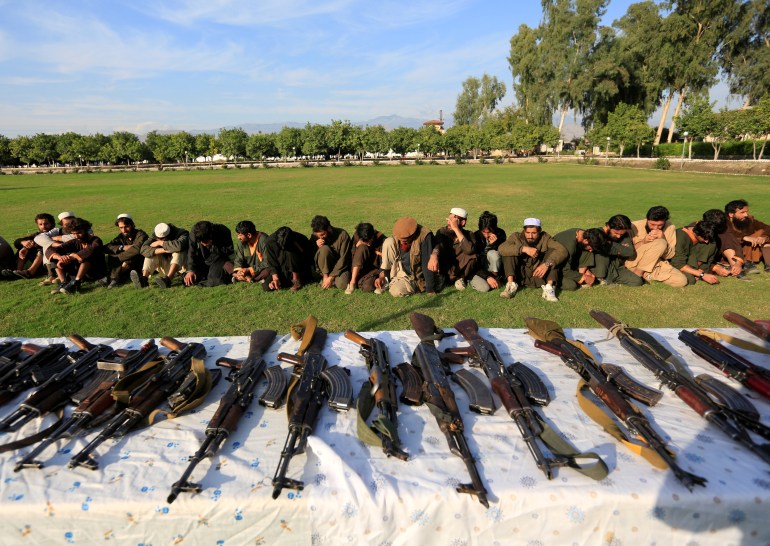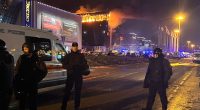More than 115 people have been killed and nearly 120 others were injured following a brazen attack on concertgoers at Moscow’s Crocus City Hall before a performance by a Soviet-era rock band on Friday.
Assailants dressed in camouflage uniforms opened fire and reportedly threw explosive devices inside the concert venue, which was left in flames with its roof collapsing after the deadly attack.
Eleven people had been detained, including four people directly involved in the armed assault, Russia’s Interfax news agency reported early on Saturday.
ISIL’s Afghan branch – also known as the Islamic State in Khorasan Province, ISKP (ISIS-K) – has claimed responsibility for the attack and United States officials have confirmed the authenticity of that claim, according to the Reuters news agency.
Here is what we know about the group and their possible motive for the Moscow attack.
ISIL’s Afghanistan branch
ISIl (ISIS) in Khorasan Province, ISKP (also known as ISIS-K) remains one of the most active affiliates of ISIL and takes its title from an ancient caliphate in the region that once encompassed areas of Afghanistan, Iran, Pakistan and Turkmenistan.
The group emerged from eastern Afghanistan in late 2014 and was made up of breakaway fighters of the Pakistan Taliban and local fighters who pledged allegiance to the late ISIL leader, Abu Bakr al-Baghdadi.
The group has since established a fearsome reputation for acts of brutality.
Murat Aslan, a military analyst and former Turkish army colonel, said ISIL’s Afghanistan affiliate is known for its “radical and tough methodologies”.
“I think their ideology inspires them in terms of selecting targets. First of all, Russia is in Syria and fighting against Daesh [ISIL] like the United States. That means they see such countries as hostile,” Aslan told Al Jazeera.

“They are now in Moscow. Previously they were in Iran, and we will see much more attacks, maybe in other capitals,” he added.
Though its membership in Afghanistan is said to have declined since a peak in about 2018, its fighters still pose one of the greatest threats to the Taliban’s authority in Afghanistan.
Previous attacks by the group
ISIS-K fighters claimed responsibility for the 2021 attacks outside Kabul airport that left at least 175 civilians dead, killed 13 US soldiers, and many dozens injured.
The ISIL affiliate was previously blamed for carrying out a bloody attack on a maternity ward in Kabul in May 2020 that killed 24 people, including women and infants. In November that same year, the group carried out an attack on Kabul University, killing at least 22 teachers and students.
In September 2022, the group took responsibility for a deadly suicide bombing at the Russian embassy in Kabul.
Last year, Iran blamed the group for two separate attacks on a major shrine in southern Shiraz – the Shah Cheragh – which killed at least 14 people and injured more than 40.
The US claimed that it intercepted communications confirming that the group was preparing to carry out attacks before coordinated suicide bombings in Iran in January this year killed nearly 100 people in the southeastern Iranian city of Kerman. ISIS-K claimed responsibility for the Kerman attacks.
Why is ISIL attacking Russia?
Defence and security analysts say the group has targeted its propaganda at Russian President Vladimir Putin in recent years over the alleged oppression of Muslims by Russia.
Kabir Taneja, a fellow at the Strategic Studies programme of the Observer Research Foundation – a think tank based in New Delhi, India – told Al Jazeera that Russia is seen by such groups as “a crusading power against Muslims”.
“Russia has been a target for ISIS and not just ISKP (ISIS-K) from the beginning,” Taneja, author of the book The ISIS Peril, said.
“ISKP attacked [the] Russian embassy in Kabul in 2022, and over the months Russian security agencies have upped their efforts to clamp down on pro-ISIS ecosystems both in Russia and around its borders, specifically Central Asia and the Caucusus,” he said.
In early March, Russia’s Federal Security Service, better known as the FSB, said it had thwarted an ISIL plan to attack a Moscow synagogue.
ISIL and Russia have also long been enemies in other battlefields, such as Syria, where Moscow’s airpower and support for Bashar al-Assad’s regime were critical in pushing back gains made by ISIL fighters in the early years of the civil war. Russian forces have also been accused by rights groups and other opposition fronts in Syria of carrying out abuses and excesses against civilians through their bombing campaigns.

Moscow’s close relations with Israel are also anathema to ISIL’s ideology, Taneja said.
“So this friction is not new ideologically, but is so tactically,” he told Al Jazeera.
There’s another factor too: Largely away from the world’s attention, the armed group has regrouped into a formidable force after setbacks in Syria and Iran.
“ISKP in Afghanistan has grown in strength significantly … and it’s not just ISKP, ISIS in its original regions of operations, Syria and Iraq, also sees [an] uptick in operational capabilities,” Taneja said. Today, he added, it is “ideologically powerful even if not politically, tactically or strategically … that powerful any more”.
That poses a challenge for a distracted world, he said.
“How to combat this is the big question at a time when big power competition and global geopolitical churn has put counterterrorism on the back burner,” Taneja added.
Previous attacks in Russia
Moscow and other Russian cities have been the targets of previous attacks.
In 2002, Chechen fighters took more than 900 people hostage in a Moscow theatre, the Dubrovka, demanding the withdrawal of Russian troops from Chechnya and an end to Russia’s war on the region.
Russian special forces attacked the theatre to end the standoff and 130 people were killed, most suffocated by a gas used by security forces to leave the Chechen fighters unconscious.
The deadliest attack in Russia was the 2004 Beslan school siege which was carried out by members of a Chechen armed group seeking Chechnya’s independence from Russia. The siege killed 334 people, including 186 children.
Read More: World News | Entertainment News | Celeb News
Aljazera










